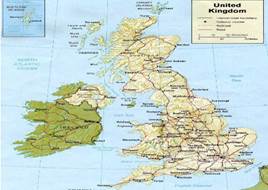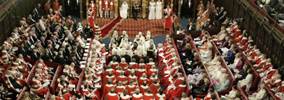READ AND TRANSLATE THE TEXT
Great Britain Geography includes information about the climate, culture, population, and heritage of Great Britain.
Great Britain comprises England, Scotland and Wales, and is located between Ireland and mainland Europe. Great Britain is the largest island in Europe. The population of Great Britain is 58,845,700 (as in 2006). Over 1000 small islands and islets encircle Great Britain. Great Britain covers a total area of 80,823 sq.mile.
England, the biggest country of Great Britain, is located in the southeast region of the British Isles. London is the largest city in Great Britain and the capital of England. The longest river in Great Britain is Severn. Other rivers include Thames, Tees, Tyne and Avon. The western part of Great Britain consists of steep hills and valleys. The high peak mountains are located in Scotland and Wales. About 25% of the overall land area in Great Britain is used for cultivation and 12% of Great Britain's total land area is covered by forests.
Great Britain has a varied climate with frequent cloud and rain. In the winter months, the average temperature remains between 5ºC in the month of January to 7ºC in March. The highest average temperatures that Britain experiences are in the months of July and August, when they remain at around 18ºC. Britain experiences steady rainfall throughout the year. It varies between an average of 31 mm in the month of February to an average of 52 mm in the month of September. The months of August and September receive the maximum rainfall.
Britain history broadly encompasses England history, Scotland history, history of Wales and Ireland history. History of Britain covers a rich panorama of thousands of years that can be broadly categorized into four distinct periods.
| The four distinct periods in which British history can be divided are: · Early Civilization - 4000BC to 1066 · Medieval period from Norman Conquest to time of Cromwell · Late 17th century up to the end of World War I · Modern History of Britain The early civilization covers the period from Stone Age to the early settlers who came to the shores of Britain. The Romans were among the first people to invade Britain. By 60 AD they controlled most of Britain and extended their rule to the south of River Humber. |
After the Romans left, the Anglo Saxons invaded Britain. They were of Germanic origin. The Anglo-Saxon period was one of the most illustrious epochs of British history, when Britain started to take the shape of a well-defined nation state. The Normans consolidated their conquest in 1066, after they forced the Anglo Saxons to leave the shores. They were followed by the Plantagenet, the Lancaster and the York dynasties.
The end of the War of Roses started a new phase in British history. This period of history witnessed the reign of Henry VIII and Elizabeth I. During the years 1660 to 1918 Britain went through various revolutions, which lay the foundation of the British Empire. From 1815 to 1914 Britain reached its zenith of glory, which was characterized by power, peace and prosperity. Britain played a key part in the World War II. Post war Britain underwent a sea wave of social change. In spite of the turmoil and obstacles, modern Britain has been recognized as one of the most powerful nations in Europe.
Wars have been a continuing feature of British history. Time and again, they have reshaped the political map of the land. The early wars continued at regular successions from 500A.D. to 1000 A.D., which resulted in Malcolm II wining the throne of Scotland. Owing to the wars, Scotland emerged as a separate nation from England.
2. FIND THE EQUIVALENTS TO THE GIVEN DEFINITIONS:
| № | DEFINITION | A WORD | |
| Comprise or contain as part of a whole. | A | HERITAGE | |
| Consist of; be made up of. | B | TO LOCATE | |
| A small island. | C | MAINLAND | |
| A large continuous extent of land that includes the greater part of a country or territory, as opposed to offshore islands and detached territories. | D | ISLET [‘AILIT] | |
| Situate in a particular place. | E | TO COMPRISE | |
| Valued objects and qualities such as historic buildings and cultural traditions that have been passed down from previous generations. | F | TO INCLUDE | |
| Form a circle around; surround. | G | A MILE | |
| A unit of linear measure equal to 1,760 yards (approximately 1.609 kilometres). | H | STEEP | |
| Rising or falling sharply; almost perpendicular. | I | ENCIRCLE | |
| Taking everything into account. | J | TO UNDERGO | |
| Occurring or done many times at short intervals. | K | TO WITNESS | |
| Continue to exist, especially after other similar people or things have ceased to do so. | L | AVERAGE | |
| An amount, standard, level, or rate regarded as usual or ordinary. | M | PANORAMA | |
| The knowledge or skill acquired by a period of practical experience of something, especially that gained in a particular profession. | N | TO ENCOMPASS | |
| An unbroken view of the whole region surrounding an observer. | O | TO REMAIN | |
| Recognizably different in nature from something else of a similar type. | P | FREQUENT | |
| The stage of human social development and organization which is considered most advanced. | Q | TO RECEIVE | |
| See (an event, typically a crime or accident) happen. | R | OVERALL | |
| Surround and have or hold within. | S | DISTINCT | |
| Be given, presented with, or paid (something) | T | CIVILIZATION | |
| Experience or be subjected to (something, typically something unpleasant or arduous) | U | EXPERIENCE |
3. TRANSLATE THE GIVEN WORDS; MAKE THE LOGICALLY CONSTRUCTED SENTENCES, USING THE TRANSLATED WORDS.
1. Наследие, Великобритания, потомки, предки, что-то, передавать, лучшее. (ancestors, descendants).
2. Находиться, 16, достопримечательность, площадь/район, Лондон.(there is/there are)
3. Вы, мочь, основная часть, увидеть, Лондон, этот, карта.
4. Маленький остров, свои, иметь, привлекательность, турист, для.
5. Национальная галерея (музей), Лондон,в, включать в, картина, 2300.
6. Букингемский дворец, монаршие особы, резиденция, а также, проведение, место, государственный, мероприятие.
7.Музей естественной истории, опыт, делиться, Земля, на, жизнь, яркий.
8. Великобритания, представитель, яркий, это, цивилизация, высокоразвитый.
ANSWER THE QUESTIONS
 – What is the official name of Great Britain?
– What is the official name of Great Britain?
– Where does the UK lie?
– What is the capital of the UK?
– How many parts are there in UK? What are they?
– What large cities of Great Britain do you know?
– How many people live in Great Britain?
– What are the main rivers of Great Britain?
– What are the colors of the Great Britain’s flag?
– What is the national emblem of England?
– What is the British money?
Home task: learn all the words by heart, find out the information about the Great Britain’s emblem (15 sentences).
Unit 2 ROYAL FAMILY
1.Her Majesty The Queen; The Queen's Role In Government

As Head of State The Queen has to remain strictly neutral with respect to political matters, unable to vote or stand for election, however Her Majesty does have important ceremonial and formal roles in relation to the government of the UK.
The formal phrase 'Queen in Parliament' is used to describe the British legislature, which consists of the Sovereign, the House of Lords and the House of Commons. The Queen's duties include opening each new session of Parliament, granting Royal Assent to legislation, and approving Orders and Proclamations through the Privy Council.
The Queen also has a special relationship with the Prime Minister, retaining the right to appoint and also meeting with him or her on a regular basis.
In addition to playing a specific role in the UK Parliament based in London, The Queen has formal roles with relation to the devolved assemblies of Scotland, Wales and Northern Ireland.